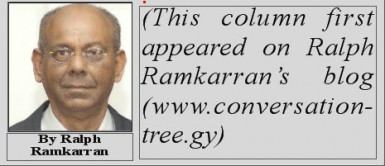Guyana has had a long history of struggle for electoral democracy. We have seen at first hand the devastating impact of manipulated elections on a country’s development and the psyche of a people. As it is, it will take several generations in the future for the suspicions and accusations over elections to disappear. It is not something that Guyana needs ever again.
 Beginning in 1990 there were many reforms which brought about free and fair elections in Guyana. The two most fundamental reforms were an agreed Chair of the Elections Commission and counting of the votes at the place of poll. These were, of course, supplemented by many other laws, regulations and practices that were agreed to between the two main political parties and enshrined in the Constitution or in the Representation of the People Act.
Beginning in 1990 there were many reforms which brought about free and fair elections in Guyana. The two most fundamental reforms were an agreed Chair of the Elections Commission and counting of the votes at the place of poll. These were, of course, supplemented by many other laws, regulations and practices that were agreed to between the two main political parties and enshrined in the Constitution or in the Representation of the People Act.
Throughout the period from 1992 there has been no difficulty in agreeing to a Chair of the Elections Commission. The request in 1990 by President Carter from Dr Jagan for six acceptable names to take to President Hoyte in 1990 brought forth Ambassador Rudy Collins as the first Chair. The manner of selecting Ambassador Collins, from six names not unacceptable to the President presented by the Leader of the Opposition, became the constitutional formula. It has never failed and four subsequent Chairs were agreed to under the formula.
Talk has been going on in legal circles about the legal basis of President Granger’s rejection of the list submitted by Leader of the Opposition, Mr Bharrat Jagdeo. It appears that after the initial explanation by President Granger, which seemed to suggest that only a judge, a former judge or a person qualified to be a judge was qualified to be appointed, which was clearly wrong, it was explained that the list was defective because it did not include at least one such person.
The opposition appeared to have decided early on that the PPP/C will not go the legal route and challenge President Granger’s interpretation of the constitutional provision on the appointment of a Chair of the Elections Commission but to give the President the benefit of the doubt and cooperate in finding an agreed Chair. The basis of the opposition’s approach is not clear and its rationale has not been made public, but if it believes that the basic minimum for legitimate elections is an agreed Chair and everything must be tried to have such a person, then it is a wise course.
The toxic responses to the outcome of elections in Guyana by the losers, and the refusal to accept the results, are due to our history of electoral malpractice, the zero sum apprehensions that attend electoral loss, driven by ethnic rivalry and insecurity. These are congealed into accusations by the losers of rigging after every election.
It was amusing but tragic to witness in the past the rapidity with which the Chairs of the Election Commission, nominated by the opposition, were reviled by that same opposition as soon as election results are out. Dr Steve Surujbally, the last of the stalwarts, was harassed by the PNCR in all the elections over which he presided. For the last elections the criticisms suddenly ceased because APNU+AFC won. The obeah that was deployed at his home in 2011 to ‘wuk pon e,’ apparently succeeded. In 2015, however, the PPP which had not previously publicly criticized Dr Surujbally, accused him of presiding over the rigging of the elections. How the tables have turned!
Our fragile electoral peace, although punctuated by violence and the refusal of the losers to accept election results, the latter of which has prevailed in relation to every elections since 1992, can only be sustained if the basic electoral reforms implemented since 1992 are retained. If the stalemate in the appointment of a Chair eventually leads to the unilateral appointment of a Chair of the Elections Commission, all that so many thousands of people have fought for and for such a long time, will be placed in serious jeopardy. All bets about tolerating elections results, however truculently, will be off.
While the formula for selecting a Chair is constitutionally enshrined and at the end of the day must be formally adhered to, it does not preclude the leaders from informally suggesting names and one of those names finding its way onto the list. However, the sense is that informal discourse outside constitutional obligations is not indulged in.
If the situation arises where the President seeks to appoint a judge, a former judge or a person qualified to be a judge, Guyana’s entire future as a democratic polity, albeit with profound challenges, will be in jeopardy. The unwritten rule that fundamental changes to electoral practices since 1992 should not be undertaken without broad consensus, notwithstanding the letter of the law, must not be allowed to fall apart. Our leaders have an obligation to rise above the differences and agree on a Chair of the Elections Commission.





